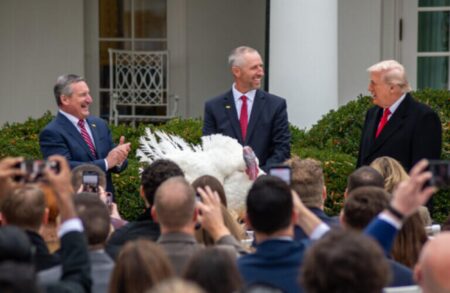Farm groups and other USDA stakeholders are raising concerns about the impact the Trump administration’s reorganization plan will have on agencies and personnel.
The planned closure of a major research center in suburban Maryland and the department’s plan to consolidate staff in five regional hubs also are drawing some opposition.
The department originally set a deadline of Aug. 26 for comments on the plan but has since extended that to Sept. 30. USDA isn’t posting the comments it has received, but some groups have released their comments or have made them available on request.
In a recent appearance at the annual Farm Progress Show in Illinois, Deputy Agriculture Secretary Stephen Vaden said the regional hubs were selected because the department already has personnel in those areas and they have a lower cost of living than Washington.
Some of the hubs “are already regional headquarters for some of our agencies. It makes sense to locate more people where we already have people, and where there is vacant office space available,” Vaden said.
The American Farm Bureau Federation supports creating the five hubs – Raleigh, North Carolina; Indianapolis; Kansas City; Fort Collins, Colorado; and Salt Lake City – but the group also is concerned about maintaining its leaders’ ability to meet with Ag Department leadership.
In a letter to Agriculture Secretary Brooke Rollins, AFBF Vice President for Public Policy Samuel A. Kieffer said “to support continued accessibility and effective collaboration, we encourage the department to maintain a presence of decision-makers from all bureaus and services in Washington, D.C., ensuring a centralized point of contact will help facilitate meaningful dialogue and strengthen partnerships between the agency and its stakeholders nationwide.”
The letter stressed that any reorganization actions should maintain adequate staffing to ensure sufficient and timely delivery of assistance to farmers, ranchers and rural communities. “We urge the department to ensure continuity of critical programs serving the agriculture industry and rural communities as it considers any organizational changes,” Kieffer said.
The National Council of Farmer Cooperatives wants to make sure there are enough county and regional staff to efficiently serve producers. In a letter to Rollins, NCFC President and CEO Duane Simpson said USDA’s county and regional staff are a trusted first point of contact “and that any reorganization must protect this footprint by maintaining adequate staffing levels in field and county offices, backfilling vacancies before further consolidation and ensuring that regional hubs complement — rather than replace — local authority and service delivery.”
Simpson also said that USDA’s Agricultural Marketing Service must maintain sufficient personnel to ensure that USDA foods purchases for schools and household programs, are done in a timely manner. He said that these purchases, “can directly affect thousands of growers through the actions taken with a single processor.”
Simpson closed by saying that NCFC supports USDA’s goals of improving efficiency, reducing duplicative processes and technological upgrades. But he added, “Efficiency must not come at the expense of responsiveness or the specialized expertise that farmer cooperatives and rural communities rely on.”
The Western Growers Association, which represents major produce growers in California and Arizona, is raising concerns with USDA’s plan to move D.C. staff to the regional hubs, including Salt Lake, which is much closer to its growers than the nation’s capital.
“For our farmers, the level of expertise and years of experience within the local D.C. region vastly outweigh any perceived proximity improvements the new hubs purport to offer. We do not share the confidence of others that current staff will relocate to Salt Lake City or other newly identified hubs, nor that there will be sufficient expertise and infrastructure in these locations to quickly fill the voids,” the group says in its comments to USDA.
The group says there are “areas that are far closer to the nation’s specialty crop epicenters than Salt Lake City; and areas that have higher concentrations of USDA infrastructure than Salt Lake City.”
The Organic Trade Association, in its comments, noted that the National Organic Program accreditation, auditing and compliance work is properly based in the field close to farmers. But the OTA also said it’s critical for the program’s policy, enforcement, and standards staff now in D.C. to “remain accessible and integrated into the federal rulemaking and enforcement framework. “Relocating these core teams out of Washington would likely result in a significant loss of institutional expertise and, in many cases, the departure of senior staff,” says OTA.
The National Farmers Union was still finishing its comments as of Tuesday, but NFU President Rob Larew said in a statement to Agri-Pulse that USDA needs to “engage stakeholders regularly and transparently.”
“Any reorganization must be carefully assessed for both efficiency and its impact on USDA’s ability to serve farmers and ranchers effectively,” he said.
Beltsville Research Center Closure Draws Concerns
Several groups with ties to nutrition, agriculture and research are calling on Rollins to reconsider the proposed closure of the Beltsville Agricultural Research Center in Maryland.
Western Growers says the Beltsville center “is the keystone for federal food safety research” and should “be maintained and continue its leadership in assuring safe and efficient production of specialty crops. BARC is instrumental in developing and verifying pragmatic solutions or the prevention of devastating crop diseases, pests, and the prevention of human pathogen contamination of fresh produce commodities.”
The group says the facility’s Environmental Microbial and Food Safety Laboratory “has been instrumental for pre- and post-harvest intervention strategies to reduce contamination risk in the produce supply chain, support compliance with FDA food safety rules, protect public health, and enhance consumption of healthy produce. EMFSL is the premiere, and one of the only laboratories in the U.S. that supports research on foodborne parasites.”
The Academy of Nutrition and Dietetics, which represents registered dietitian nutritionists, asked Rollins in a letter to reconsider the reorganization plan. “We are alarmed by the planned closure of the Beltsville Human Nutrition Research Center, which provides essential data for national nutrition policy,” the group says.
A group of honeybee scientists and beekeeping industry leaders is expressing its opposition to relocating BARC. A letter by the scientists quotes David Tarpy of North Carolina State University saying Beltsville “is ideally situated to connect industry, university research, and policymakers to make substantial differences in the lives of beekeepers; there cannot be a more well-suited location for USDA honeybee research in the nation.”
Solutions from the Land, in comments to USDA, calls BARC “a cornerstone of U.S. agricultural science,” and that its closure would “lead to the loss of world-class scientific talent.”
“The consequences of shuttering BARC would be far-reaching, placing agricultural productivity, farmer profitability, and the resilience of U.S. agriculture at significant risk at a time when global food systems face mounting challenges,” the letter said.
The Weed Science Society of America and regional affiliates that represent weed scientists urged USDA not to close any Agricultural Research Service facilities. “These labs not only support the innovation and scientific discovery that keep American agriculture competitive, but they also address urgent challenges such as herbicide resistance, invasive species, soil health, food security, and targeted and autonomous weed control,” the groups say in their comments.
Data Scientists: Keep Statistics Agencies in D.C.
The American Statistical Association, which represents statisticians and data scientists, says that forcing personnel at the National Agricultural Statistics Service and Economic Research Service to relocate will handicap already depleted agencies.
The group says in its comments that relocations are “likely to result in major disruptions, including product delays and suspensions, resulting in the loss of timely, reliable data for farmers, ranchers, and policymakers. The employees of both agencies are already heavily burdened by the loss of nearly a third of their fellow employees this year, putting the agencies’ products at increased risk of disruption.”
The agencies should instead be co-located in Washington where they would remain in close contact with USDA’s World Agricultural Outlook Board and its “highly sensitive monthly meetings held to prepare their market-moving data releases.”
The group’s letter noted that three-quarters of ERS positions were moved to Kansas City in 2019, resulted in significant attrition because researchers declined to relocate.
“Although staffing levels eventually recovered, the new workforce was largely composed of less-experienced employees, and the agencies lost critical institutional knowledge. … The 2019 move resulted in a ‘hollowing out’ of the agencies, with approximately 75% of staff leaving,” the statistical association says.
Meanwhile, a coalition of nutrition advocacy groups have raised concerns about the impact of the reorganization on USDA’s Food and Nutrition Service, which oversees school meal programs; the Women, Infants and Children assistance program; and the Supplemental Nutrition Assistance Program.
“These changes will result in the loss of valuable civil servants and the consequent loss of expertise. This will impede effective communication with state governments as major administrative and financial changes happen to SNAP as outlined in the One Big Beautiful Bill Act,” the National Alliance for Nutrition and Activity says in a letter. “Building on that specific issue, we are concerned about the elimination of regional offices in the Northeast and West Coast, which will move FNS staff farther away from many of the WIC agencies they support.”
This article was originally published by Agri-Pulse. Agri-Pulse is a trusted source in Washington, D.C., with the largest editorial team focused on food and farm policy coverage.


:max_bytes(150000):strip_icc()/Markets-3-Corn-up-3-19bdbeee0041452db8bce0a0f1c8b883.jpeg)
:max_bytes(150000):strip_icc()/36724362670_ae7c5cd98a_o-86f368af04cd40cd89d9d669d850f7cd.jpg)



:max_bytes(150000):strip_icc()/52513708671_2a6075fabe_o-dcd59efb1faf4c40afb3d8f39629aa7d.jpg)


:max_bytes(150000):strip_icc()/turkeys-ars-usda-photo-4e39a75271024f29be022ff9976b4440.jpg)
:max_bytes(150000):strip_icc()/Markets-10-Corn-up-wheat-up-5-a41d988ceef74aedbcbc093b791d7bdc.jpeg)